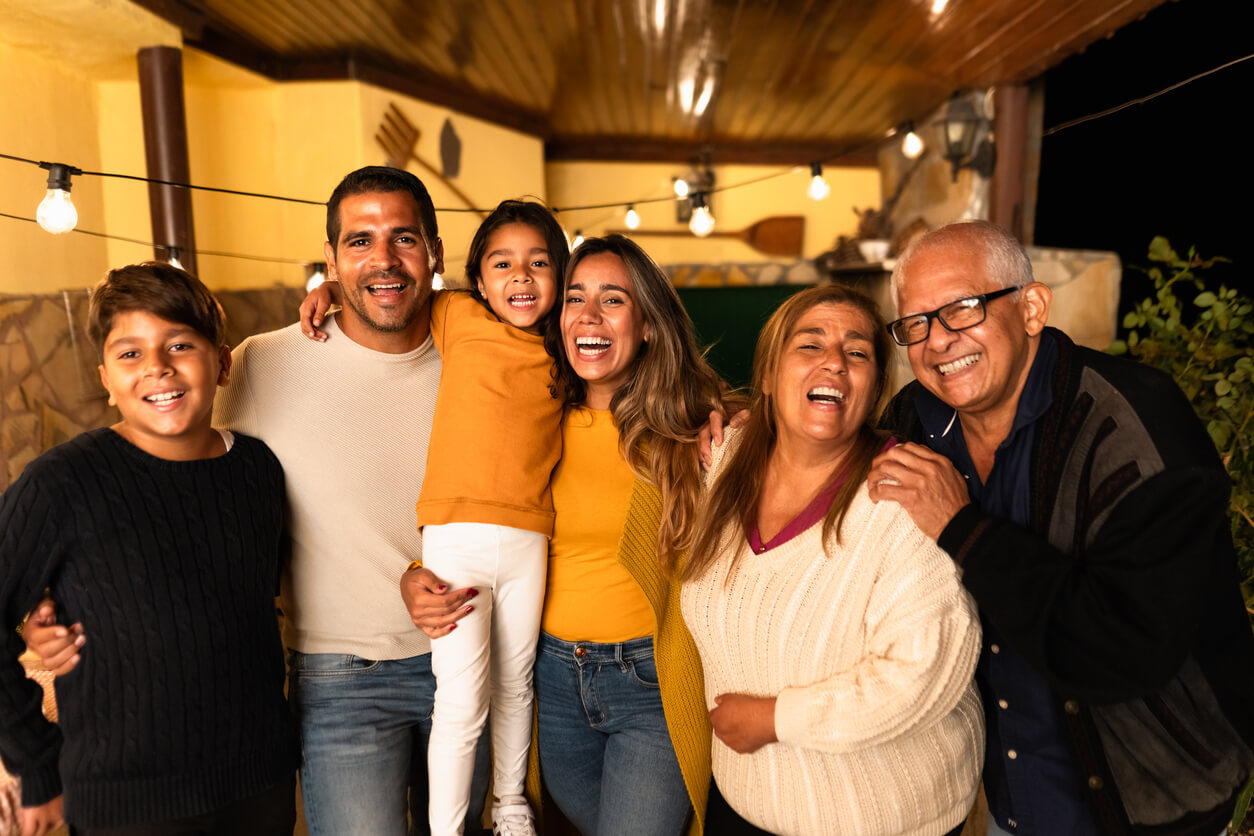Family Resilience: Strength Lies in Unity


Written and verified by the psychologist Mara Amor López
Family resilience is a very important tool for everyone’s health. It contributes to security, adaptation, and overcoming difficulties. Therefore, it helps us to achieve success from a positive point of view.
We can say that resilience is based on hope, optimism, motivation, well-being, and the ability to cope with difficult situations. Not all families are able to cope with adversity in a positive way–only resilient families are able to do so. In this article, we’ll tell you more about this topic. You can’t miss it!
What’s family resilience?
Before going into the details, it’s important to define the concept. Therefore, we can differentiate between individual resilience and family resilience.
Individual resilience
Resilience is the ability we have to cope with difficult situations, but without ceasing to be happy. We can compare it to a piece of modeling clay that, although it receives blows, is squeezed, and takes on other forms, its essence remains unchanged. Furthermore, to understand this capacity, we mustn’t only focus on the individual, but also on their social and family environment.

Family resilience
Family resilience can be defined as the set of behaviors and the processes of overcoming and adapting that a family has as a functional unit. In short, it’s a very important instrument for health. Moreover, thanks to it, we’ll emerge strengthened and transformed from the crises we face.
Family resilience depends a lot on the cultural and family context, the level of development, and the resources available to the family. It also depends on a shared vision of the problem. Our family is our support system amidst adversities, so, if we count on their collaboration, we’ll be able to overcome difficulties with greater success. In addition, their support and company give us security and increase our capacity to respond to pain.
Family resilience: Unity is strength
Family resilience makes it clear to us that we’re not alone in the world. We know that we have the support of our family, which is also part of who we are. It’s part of our identity and our ability to be happy. Therefore, the family to which we belong can be our source of joy, but also the opposite. For example, an unstructured family implies the vulnerability of all the members of that home.
For all this, it’s key to keep the family united so that all its members help each other and collaborate to overcome the adversities that arise. In this way, there will be a better functioning and the relationships among its components will be healthy.
Michel Delage (2010) explains what the main capacities for the construction of family resilience are:
- The capacity for mutual protection
- Optimal management of emotions
- Communication between all members
- The forms of interaction, resources, and competencies of all in the face of adversities or crises
- Personal and group mentalization

How are resilient families characterized?
Resilient families are able to cope with adversity and emerge stronger. These families are characterized by:
- They stimulate the ability to listen and learn from their members.
- They find psychological protection through optimism.
- They promote the collaboration of all members in family tasks.
- They look for moments and places to interact in order to teach life skills.
- They learn to raise and defend their ideas with the ability to debate with respect.
- They encourage their members to express interest and love within the family by expressing and managing their emotions in a healthy way.
- They encourage and demonstrate confidence in the abilities of all family members to succeed.
- They’re able to observe their individual actions, as well as those of the rest of the members, and are self-critical.
- They carry out activities as a family and plan them together.
- They don’t feel isolated or limited by the difficulties of their members.
- When faced with stressful family situations, they reflect together to find solutions, listen to everyone’s opinion, and choose the best option.
Support and strengthen each other
Family resilience is a very important aspect that we should all integrate into our families. Supporting each other and sharing difficulties will allow us to emerge stronger and be transformed after adversities. Being a resilient family makes the health of all its members much better and gives them the ability to adapt to the changes that may come.
And you, do you think you’re resilient in your family? If not, start working on it. Together, you can go further and come out stronger in the face of difficulties.
“It is not adversity, but your reaction to adversity, that will determine the development of your life.”– Dieter F. Uchtdorf –
Family resilience is a very important tool for everyone’s health. It contributes to security, adaptation, and overcoming difficulties. Therefore, it helps us to achieve success from a positive point of view.
We can say that resilience is based on hope, optimism, motivation, well-being, and the ability to cope with difficult situations. Not all families are able to cope with adversity in a positive way–only resilient families are able to do so. In this article, we’ll tell you more about this topic. You can’t miss it!
What’s family resilience?
Before going into the details, it’s important to define the concept. Therefore, we can differentiate between individual resilience and family resilience.
Individual resilience
Resilience is the ability we have to cope with difficult situations, but without ceasing to be happy. We can compare it to a piece of modeling clay that, although it receives blows, is squeezed, and takes on other forms, its essence remains unchanged. Furthermore, to understand this capacity, we mustn’t only focus on the individual, but also on their social and family environment.

Family resilience
Family resilience can be defined as the set of behaviors and the processes of overcoming and adapting that a family has as a functional unit. In short, it’s a very important instrument for health. Moreover, thanks to it, we’ll emerge strengthened and transformed from the crises we face.
Family resilience depends a lot on the cultural and family context, the level of development, and the resources available to the family. It also depends on a shared vision of the problem. Our family is our support system amidst adversities, so, if we count on their collaboration, we’ll be able to overcome difficulties with greater success. In addition, their support and company give us security and increase our capacity to respond to pain.
Family resilience: Unity is strength
Family resilience makes it clear to us that we’re not alone in the world. We know that we have the support of our family, which is also part of who we are. It’s part of our identity and our ability to be happy. Therefore, the family to which we belong can be our source of joy, but also the opposite. For example, an unstructured family implies the vulnerability of all the members of that home.
For all this, it’s key to keep the family united so that all its members help each other and collaborate to overcome the adversities that arise. In this way, there will be a better functioning and the relationships among its components will be healthy.
Michel Delage (2010) explains what the main capacities for the construction of family resilience are:
- The capacity for mutual protection
- Optimal management of emotions
- Communication between all members
- The forms of interaction, resources, and competencies of all in the face of adversities or crises
- Personal and group mentalization

How are resilient families characterized?
Resilient families are able to cope with adversity and emerge stronger. These families are characterized by:
- They stimulate the ability to listen and learn from their members.
- They find psychological protection through optimism.
- They promote the collaboration of all members in family tasks.
- They look for moments and places to interact in order to teach life skills.
- They learn to raise and defend their ideas with the ability to debate with respect.
- They encourage their members to express interest and love within the family by expressing and managing their emotions in a healthy way.
- They encourage and demonstrate confidence in the abilities of all family members to succeed.
- They’re able to observe their individual actions, as well as those of the rest of the members, and are self-critical.
- They carry out activities as a family and plan them together.
- They don’t feel isolated or limited by the difficulties of their members.
- When faced with stressful family situations, they reflect together to find solutions, listen to everyone’s opinion, and choose the best option.
Support and strengthen each other
Family resilience is a very important aspect that we should all integrate into our families. Supporting each other and sharing difficulties will allow us to emerge stronger and be transformed after adversities. Being a resilient family makes the health of all its members much better and gives them the ability to adapt to the changes that may come.
And you, do you think you’re resilient in your family? If not, start working on it. Together, you can go further and come out stronger in the face of difficulties.
“It is not adversity, but your reaction to adversity, that will determine the development of your life.”– Dieter F. Uchtdorf –
All cited sources were thoroughly reviewed by our team to ensure their quality, reliability, currency, and validity. The bibliography of this article was considered reliable and of academic or scientific accuracy.
- Gómez, E., & Kotliarenco, M. A. (2010). Resiliencia Familiar: un enfoque de investigación e intervención con familias multiproblemáticas. Revista de psicología, 19(2), 103-131.
-
Bravo, H., & López, J. (2015). Resiliencia familiar: una revisión sobre artículos publicados en español. Revista de investigación en Psicología, 18(2), 151-170. https://revistasinvestigacion.unmsm.edu.pe/index.php/psico/article/view/12089
-
de Andrade Seidl, M. L., & da Cruz Benetti, S. P. (2011). Resiliencia familiar: nuevas perspectivas en la promoción y prevención en salud. Diversitas, 7(1), 43-55. https://revistas.usantotomas.edu.co/index.php/diversitas/article/view/141
- Quesada, C. V. (2003). El concepto de resiliencia individual y familiar. Aplicaciones en la intervención social. Psychosocial Intervention, 12(3), 283-299. https://www.redalyc.org/pdf/1798/179818049003.pdf
This text is provided for informational purposes only and does not replace consultation with a professional. If in doubt, consult your specialist.








